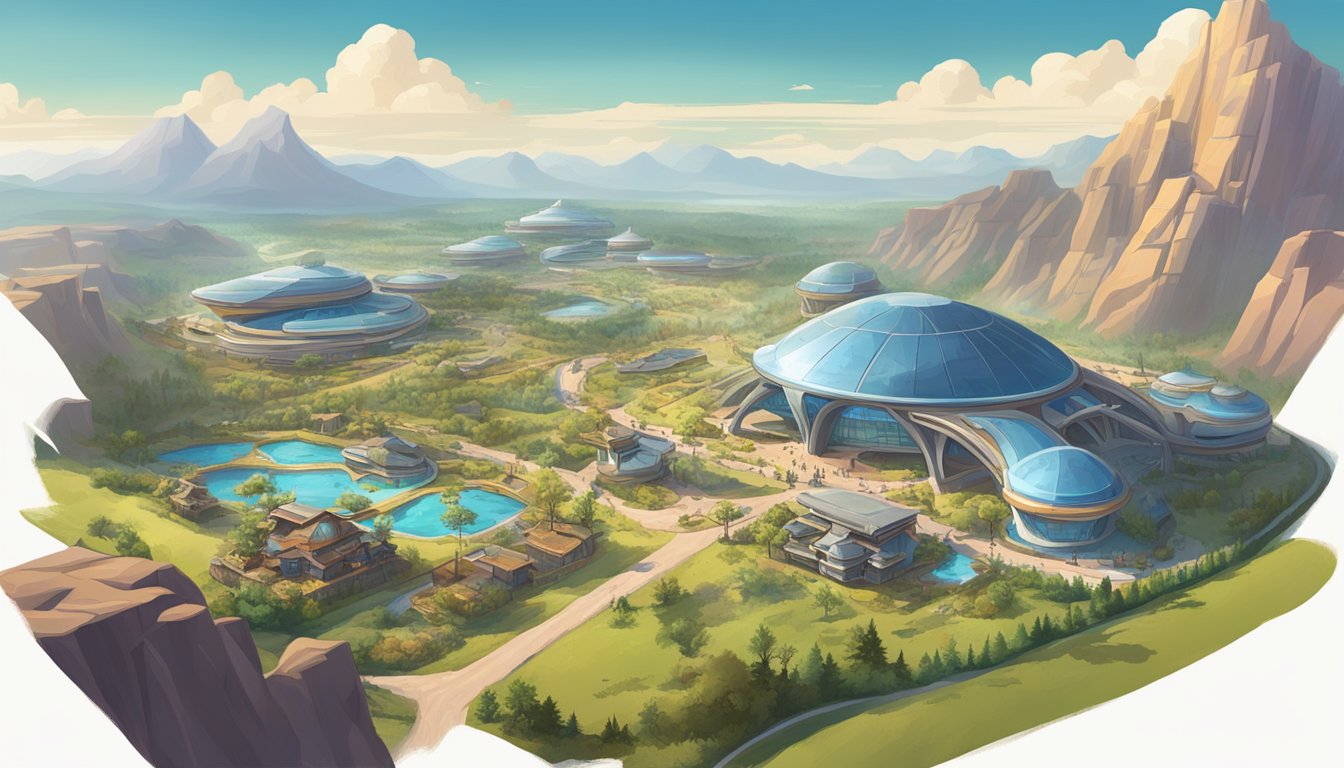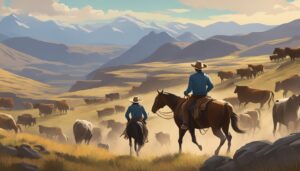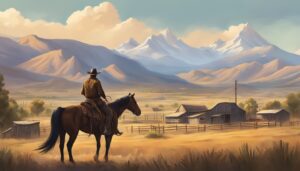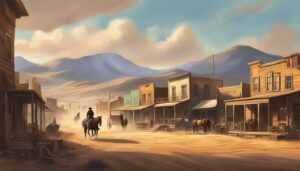Yellowstone and Westworld have emerged as two of the most talked-about Western TV shows in recent years. While both series fall under the Western genre, they offer vastly different viewing experiences. Yellowstone, created by Taylor Sheridan, is a contemporary Western drama that follows the Dutton family’s struggles to maintain control of their vast ranch in Montana. Westworld, on the other hand, blends Western themes with science fiction, exploring the ethics of artificial intelligence in a futuristic theme park.
Yellowstone’s gritty realism and complex family dynamics make it the superior choice for viewers seeking a traditional Western experience. The show’s portrayal of modern-day conflicts between ranchers, land developers, and Native Americans resonates with audiences looking for authentic storytelling. Westworld’s innovative premise and mind-bending plot twists appeal to those who enjoy science fiction elements mixed with their Western settings.
Both shows have garnered critical acclaim and devoted fan bases. Yellowstone airs on the Paramount Network, while Westworld is an HBO production. The choice between the two ultimately depends on viewer preferences for either a straightforward Western drama or a genre-bending sci-fi Western hybrid.
Overview of Yellowstone
Yellowstone stands as a landmark modern Western television series, blending family drama with contemporary ranch life in Montana. The show has captivated audiences with its compelling characters and exploration of power dynamics in the American West.
Origins and Creators
Taylor Sheridan, a seasoned actor and writer, created Yellowstone as a gritty portrayal of modern ranching. The series premiered on the Paramount Network in 2018, marking Sheridan’s transition from screenwriter to showrunner. His vision for Yellowstone stemmed from personal experiences and a desire to showcase the complexities of rural America.
Sheridan’s approach to storytelling combines elements of classic Westerns with contemporary issues. He assembled a talented cast, including Kevin Costner as the patriarch John Dutton, to bring his characters to life. The show’s production values and attention to detail reflect Sheridan’s commitment to authenticity.
Setting and Themes
Yellowstone is set against the backdrop of Montana’s breathtaking landscapes, centered on the vast Dutton Ranch. The series explores themes of land ownership, family legacy, and the clash between tradition and progress. The Dutton family’s struggle to maintain control of their ancestral land drives much of the conflict.
Key themes include:
- Power struggles between ranchers, developers, and Native American tribes
- Family loyalty and intergenerational conflict
- The impact of modernization on rural ways of life
- Political corruption and manipulation
The show delves into complex relationships within the Dutton family, examining how their personal dynamics intersect with broader societal issues.
Critical Reception and Influence
Yellowstone has garnered widespread popularity and critical acclaim. The series has been praised for its strong performances, particularly Costner’s portrayal of John Dutton. Critics have highlighted the show’s cinematography and its nuanced exploration of contemporary Western themes.
The success of Yellowstone has led to the creation of a broader franchise, including prequels like “1883” and “1923”. These spin-offs expand the Dutton family saga across different time periods. Yellowstone’s influence extends beyond television, reigniting interest in Western-themed entertainment and sparking discussions about land use and rural American issues.
The show’s impact on pop culture is evident in its growing fanbase and its ability to attract viewers who may not typically engage with Western genres. Yellowstone has set a new standard for modern Western dramas on television.
Overview of Westworld

Westworld blends science fiction and Western genres to create a unique television experience. The HBO series explores complex themes of consciousness, free will, and human nature through its intricate plot and multifaceted characters.
Concept and Development
Westworld is based on the 1973 film of the same name by Michael Crichton. HBO’s adaptation, created by Jonathan Nolan and Lisa Joy, premiered in 2016. The show is set in a futuristic theme park where guests can live out their wildest Western fantasies.
Lifelike androids called “hosts” populate the park. They are programmed to fulfill visitors’ desires without memory of past interactions. As the series progresses, some hosts begin to gain self-awareness.
The show’s development involved extensive world-building. Creators meticulously crafted the park’s mythology, technology, and ethical dilemmas.
Narrative and Symbolism
Westworld’s narrative unfolds through multiple timelines and perspectives. This non-linear storytelling keeps viewers engaged and challenges their perceptions of reality.
Key themes include:
- The nature of consciousness
- The ethics of artificial intelligence
- Power dynamics between creators and their creations
- The blurred lines between humanity and technology
Symbolism plays a crucial role. The maze represents the hosts’ journey to self-awareness. The player piano symbolizes programmed behavior vs. free will.
Characters like Dolores, Maeve, and the Man in Black embody different aspects of the human condition and the quest for identity.
Cultural Impact and Legacy
Westworld has made a significant impact on popular culture since its debut. The show’s exploration of AI ethics and the potential consequences of advanced technology resonates with contemporary concerns.
Its intricate plot and philosophical undertones have sparked countless fan theories and discussions online. Westworld’s influence extends to academic circles, where it’s studied for its portrayal of consciousness and technological ethics.
The series has received critical acclaim for its:
- Stellar performances
- High production values
- Thought-provoking themes
It has garnered numerous award nominations and wins, cementing its place in the pantheon of prestige television.
Comparative Analysis: Storytelling and Direction

Yellowstone and Westworld take different approaches to storytelling and direction within the Western genre. Each show employs unique narrative structures and artistic visions to bring their worlds to life.
Narrative Structure and Complexity
Yellowstone follows a more traditional linear narrative, focusing on the Dutton family’s struggles to maintain their ranch. The show weaves multiple storylines together, exploring family dynamics, political intrigue, and land disputes. Taylor Sheridan’s writing creates a web of complex characters with conflicting motivations.
Westworld, in contrast, employs a non-linear narrative structure. The show jumps between different timelines and realities, challenging viewers to piece together the puzzle. Its sci-fi elements allow for intricate plotlines involving artificial intelligence, consciousness, and the nature of free will.
Both series feature ensemble casts, but Yellowstone centers on John Dutton as the patriarch, while Westworld spreads focus across multiple protagonists.
Directorial Style and Artistic Vision
Yellowstone’s direction emphasizes the raw beauty of the American West. Wide shots showcase Montana’s landscapes, integrating the setting as a character itself. The show’s cinematography captures the rugged lifestyle of modern cowboys, blending traditional Western imagery with contemporary elements.
Westworld’s direction leans heavily into its sci-fi roots. The show juxtaposes Western aesthetics with futuristic technology, creating a visually striking contrast. Its use of practical effects and CGI brings the park’s artificial world to life, blurring the lines between reality and simulation.
Both series employ violence as a storytelling tool, but Yellowstone’s is more grounded in realism, while Westworld’s often serves to highlight the artificiality of its world.
Characters and Casting
Yellowstone and Westworld both feature stellar ensemble casts that bring complex characters to life. These shows excel in their portrayal of intricate family dynamics and morally ambiguous individuals, captivating audiences with powerful performances.
Iconic Roles and Performances
Kevin Costner’s portrayal of John Dutton in Yellowstone stands out as a career-defining role. His commanding presence anchors the show, embodying the rugged patriarch fighting to protect his family’s legacy. The Dutton family dynamics are further enhanced by strong performances from Luke Grimes, Kelly Reilly, and Wes Bentley.
Westworld boasts an equally impressive cast. Evan Rachel Wood’s portrayal of Dolores Abernathy evolves dramatically throughout the series. Ed Harris brings gravitas to the enigmatic Man in Black, while Thandiwe Newton’s Maeve Millay captivates with her journey of self-discovery.
Character Development and Depth
Yellowstone excels in crafting multi-dimensional characters within its modern Western setting. The show explores the complexities of family loyalty, power struggles, and personal demons. John Dutton’s children, each with their own ambitions and flaws, provide rich storylines that keep viewers invested.
Westworld takes character development to new heights, literally rewriting its artificial beings’ core drives and motivations. The hosts’ journey from programmed automatons to self-aware individuals forms the heart of the series. Human characters also face moral dilemmas, blurring the lines between man and machine.
Both shows demonstrate a commitment to character growth, ensuring that protagonists and antagonists alike evolve over time, keeping audiences engaged season after season.
Cultural and Societal Reflections

Yellowstone and Westworld offer distinct perspectives on the American West, exploring themes of identity, power, and progress through different lenses. Their narratives reflect and comment on contemporary societal issues while reimagining classic Western tropes.
Representation of the American West
Yellowstone portrays a modern vision of the American West, focusing on land disputes and the clash between traditional ranching culture and contemporary forces of change. The show depicts cowboys, Native Americans, and wealthy outsiders vying for control of vast territories. This representation resonates with viewers concerned about rural preservation and cultural heritage.
Westworld takes a futuristic approach, using an artificial Wild West theme park as a metaphor for human nature and technological advancement. The series examines the concept of free will and the ethics of artificial intelligence. Its depiction of the West is a constructed fantasy, serving as a backdrop for exploring deeper philosophical questions about consciousness and reality.
Modern Relevance and Themes
Both shows address current societal issues through their Western settings. Yellowstone tackles topics like land rights, political corruption, and family loyalty. It reflects anxieties about changing demographics and economic pressures in rural America. The series also explores the complex relationships between ranchers, Native American tribes, and government entities.
Westworld uses its sci-fi Western premise to comment on contemporary concerns such as data privacy, corporate power, and the potential consequences of advanced AI. The show raises questions about the nature of humanity and the ethical implications of creating sentient beings for entertainment. It challenges viewers to consider the impact of technology on personal identity and social structures.
Fan Engagement and Fandom

Yellowstone and Westworld have cultivated passionate fan bases that actively engage with the shows and their expanded universes. These fandoms contribute to the series’ success through online discussions, merchandise purchases, and support for spin-off content.
Fan Communities and Discussions
Yellowstone fans gather on platforms like Reddit and Facebook to dissect episodes, theorize about character arcs, and share their love for the Dutton family saga. The show’s neo-Western setting resonates with viewers who appreciate its portrayal of modern ranch life and family dynamics. Westworld’s complex narrative and sci-fi elements inspire intense debate among fans, who meticulously analyze each episode for clues and hidden meanings.
Online forums buzz with discussions about Taylor Sheridan’s expanding Yellowstone universe, including prequels 1883 and 1923. Fans eagerly speculate about connections between these shows and the main series.
Merchandise and Spin-offs
Both shows have capitalized on their popularity through merchandise and expanded content. Yellowstone-branded clothing, home decor, and even whiskey allow fans to bring a piece of the Dutton ranch into their lives. The franchise has successfully launched spin-offs like 1883 and 1923, further engaging viewers with the Dutton family history.
Westworld’s merchandise focuses on the show’s futuristic elements, offering replicas of in-show technology and clothing inspired by both its Western and sci-fi aesthetics. While Westworld hasn’t produced direct spin-offs, its immersive website and alternate reality games extend the viewer experience beyond the screen.
Conclusion

Yellowstone and Westworld offer distinct takes on the Western genre. Yellowstone delivers a gritty, modern-day family drama set against the backdrop of Montana ranching. Its focus on real-world conflicts and power struggles resonates with many viewers.
Westworld, in contrast, blends Western aesthetics with science fiction themes. The show’s complex narrative and philosophical questions about consciousness provide a unique twist on traditional Western tropes.
Both series showcase strong performances and high production values. Yellowstone excels in its portrayal of contemporary ranch life and family dynamics. Westworld stands out for its ambitious storytelling and exploration of technology’s impact on humanity.
The choice between the two ultimately depends on viewer preferences. Fans of traditional Westerns may gravitate towards Yellowstone’s more grounded approach. Those seeking a genre-bending experience might find Westworld’s sci-fi elements more appealing.
Both shows have garnered critical acclaim and dedicated fan bases. They demonstrate the enduring appeal of Western themes in television, whether presented in a straightforward or reimagined format.



